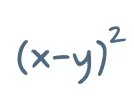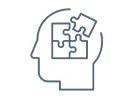Learning disorders are a biological condition which can affect anyone regardless of age. They impact the brain’s ability to accurately and efficiently process information. People with a learning disorder may struggle to process, understand, communicate, and remember information. They may try hard, but still have difficulty spelling, reading, writing, solving math problems, understanding basic concepts, paying attention, and remembering information. This can make them feel alone, embarrassed, inadequate, and misunderstood, and they may start acting out, stop trying, or withdraw.
Understanding whether you or your child has a learning disorder is an important step in getting the help you or your child needs. Assessments are key for determining if you or your child needs extra support and services. For children, early intervention is especially important so they can learn foundational skills, like reading, writing, and math, on which to build more advanced knowledge.
Our assessments go beyond identifying specific learning disabilities; we strive to uncover nuanced aspects and rule out alternative explanations, like ADHD or Intellectual Developmental Disorder. We also offer recommendations for how to use the results and next steps you can take. Discovering and addressing these challenges is a crucial step to receiving accommodations and empowering yourself or your child to thrive academically, at work, and in life.
All learning disorders exams start at $1,950
Old Town Psychology currently assesses for the following:
Reading Difficulties (Dyslexia):
Is it difficult to accurately pronounce or recognize words? Is reading aloud slow, inaccurate, or effortful? Is spelling a struggle? Is reading something that’s avoided? If so, you or your child may have dyslexia, a learning disorder that makes it hard to spell, recognize, and decode words.
Math Difficulties (Dyscalculia):
Was it difficult to learn how to count? Are numbers often reversed? Is it a struggle to do math problems, understand number sense, or engage in math reasoning? If so, you or your child may have dyscalculia, a learning disorder that makes it hard to process numerical information.
Writing Difficulties (Dysgraphia):
Is it difficult to write in a straight line? Are written letters often reversed? Is it a struggle to write sentences with correct grammar and punctuation? Are activities that involve writing avoided? If so, you or your child may have dysgraphia, a learning disorder that makes it hard to turn thoughts into written language.
Is it difficult to pay attention for sustained periods? Is it hard to stay organized? Is it common to talk excessively or interrupt others? Is it a struggle to sit still without squirming or fidgeting? If so, you or your child may have Attention-Deficit/Hyperactivity Disorder (ADHD). Our assessments are able to determine whether you have a learning disorder, ADHD, or both. Read more about the how we assess for ADHD here.
Intellectual Development Disorders:
Has it been difficult to learn academic skills like reading, writing, math, time, or money? Is abstract thinking, planning, making judgements, and short-term memory a struggle? Is it difficult to relate to or communicate with others? Are complex daily activities hard to complete without help? If so, you or your child may have an intellectual developmental disorder. This is different from a learning disorder and is important to differentiate as those with intellectual developmental disorders require help with general mental abilities and activities of daily living.
Next Steps
If you have any questions or would like to schedule a Learning Disorder assessment, please contact Old Town Psychology at (571) 478-9499, via email at info@oldtownpsychology.com, or submit a message below.
We are a 10 minute walk from the King Street Metro station.







